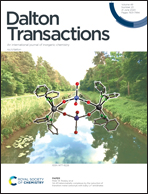Heteroleptic Ir(iii) complexes with varied π-conjugated diimine ligands: synthesis, tunable triplet states and nonlinear absorption properties†
Abstract
Four heteroleptic Ir(III) complexes (Ir-1–Ir-4) with varied π-conjugated diimine ligands were synthesized. Their optical properties were investigated systematically via spectroscopic methods, in order to elucidate the influence of the extended π-conjugation on the singlet and triplet states of the molecules. All these Ir(III) complexes exhibit ligand localized 1π,π* transitions below 370 nm, and broad metal-to-ligand and ligand-to-ligand charge transfer (MLCT/LLCT) absorption bands in the visible region. Extending the π-conjugation in diimine ligands influences the electron distribution of the triplet state. The 3π,π* dominated Ir(III) complexes (Ir-3 and Ir-4) exhibit long-lived triplet states and low phosphorescence quantum yields, compared with the charge transfer dominated Ir(III) complexes (Ir-1 and Ir-2). Complexes Ir-3 and Ir-4 exhibit broadband transient absorption spectra from 420 to 750 nm, between which the nonlinear absorption could be observed by virtue of reverse saturable absorption. The results of nonlinear transmission measurements using 532 nm laser pulses further elucidate that selected complexes Ir-3 and Ir-4 are promising candidates for optical limiting applications.



 Please wait while we load your content...
Please wait while we load your content...